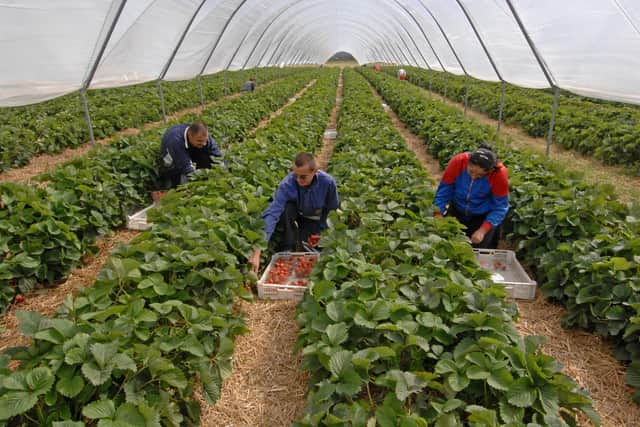Scottish farming and food groups urge James Cleverly to reconsider UK immigration laws
Home secretary James Cleverly has been urged to rethink new changes to immigration policy that leading groups in Scotland’s farming and food and drink sector claim could harm the supply chain.
The UK government is poised to increase the earnings thresholds for those arriving on the Skilled Worker route, with the minimum threshold rising by 48 per cent from £26,200 to £38,700 from April. The move is an attempt to reduce net migration to the country.
Advertisement
Hide AdAdvertisement
Hide AdScotland Food and Drink, NFU Scotland and other key food and farming industry stakeholders have written a joint letter to Mr Cleverly saying they are concerned about how the new policy changes will increase the threat to what is already a damaged supply chain.


They said the increase will make the new minimum pay level higher than many of the vacant roles across the industry. This, and the other proposed changes, could make it harder for businesses to recruit from overseas and for workers who might have considered applying, the groups have said.
The letter has also been signed by Quality Meat Scotland, Salmon Scotland, Seafood Scotland and the Scottish Agricultural Organisation Society.
The stakeholders said the immigration changes would worsen the existing labour shortage, reduce profitability, increase prices and cause disruptions along the supply chain.


Humza Yousaf urged to return £46m to agriculture budget when addressing Scotland farmers' conference
Labour shortages in the country are already reducing productivity and driving up operational costs, which has led to an increase in food prices for consumers.
The letter read: “We think this is the wrong approach and ignores the essential role that overseas workers play in our industry, and our society. It is, of course, important to manage immigration effectively, and to ensure that communities continue to have the infrastructure and public services they need.
"It is equally vital to protect our economy and businesses, which already lack a sufficient pool of labour, to ensure communities across the UK have access to affordable, high-quality food and drink, and to protect an industry that employs hundreds of thousands of people and generates £15 billion a year in Scotland alone.


“We need to secure a resilient, productive food supply chain operating across the UK. This requires a large, diverse workforce.
Advertisement
Hide AdAdvertisement
Hide Ad"Raising the minimum salary threshold for skilled workers from overseas at a time of existing labour shortages will increase the threat to the stability of the whole supply chain, from primary production through to manufacturers, retail, and hospitality providers.”
Scotland Food & Drink carried out an industry survey into labour shortages in 2023 that showed 92 per cent of respondents across a wide range of sectors indicated they were unable to find or attract enough suitable employees to meet their operational needs.
The letter added: “Our industry’s reach from farm to fork, and the accompanying requirement for labour, is vast. We recruit and value thousands of skilled workers from overseas to help to maintain the quality and availability of our ingredients and products. Frankly, we could not do what we do without our overseas workers. We are proud to be a major employer, a major contributor to exports, and, in many ways, the engine for economic growth in Scotland.”


The letter has urged the UK government to reconsider its proposals and apply a more positive approach to immigration; one that recognises “the essential role of overseas workers to fill labour shortages in our food and drink industry”.
The Home Office has been contacted for comment.
Comments
Want to join the conversation? Please or to comment on this article.